The views expressed in our content reflect individual perspectives and do not represent the authoritative views of the Baha'i Faith.
By the time of his death on November 28, 1921, Abdu’l-Baha had written and spoken tirelessly regarding unity as the stated purpose animating the revelation of his father Baha’u’llah.
Abdu’l-Baha expanded on the mindset necessary to further this major Baha’i goal.
The unity which is productive of unlimited results is first a unity of mankind which recognizes that all are sheltered beneath the overshadowing glory of the All-Glorious; that all are servants of one God; for all breathe the same atmosphere, live upon the same earth, move beneath the same heavens, receive effulgence from the same sun and are under the protection of one God. This is the most great unity, and its results are lasting if humanity adheres to it… – Abdu’l-Baha, Foundations of World Unity, p. 66.
During his visit to America in 1912, Abdu’l-Baha understood the potential for racial equality to exist in a country that just 50 years before had abolished slavery with the Emancipation Proclamation. He was also aware of the limiting social beliefs regarding race that bound Americans, including the early American Baha’is. Achieving this “most great unity” would involve a long and difficult process, but delay in addressing the issue would prevent the necessary foundation for lasting unity to exist in any realm of human endeavor, be it cultural, political, religious or scientific.
In a society dominated by corrosive and pernicious racism, how could Abdu’l-Baha elevate both human thought and action beyond common practice? As a starting point, he frequently used the word tolerance when speaking and writing about human unity. Wikipedia defines tolerance as a “permissive attitude” toward those who differ from us.
For early 20th century Americans, the promotion of racial tolerance pushed hard against social convention, but Abdu’l-Baha happily embarked on his initial confrontation with American racism. He knew that mere tolerance and liberal views were just stepping stones leading to the only lasting solutions to racial prejudice—love and unity:
Love and fellowship are absolutely needful to win the good-pleasure of God, which is the goal of all human attainment. We must be united. We must love each other. We must ever praise each other. We must bestow commendation upon all people, thus removing the discord and hatred which have caused alienation amongst men. – Abdu’l-Baha, Foundations of World Unity, p. 99.
By his own example, Abdu’l-Baha began to personally illustrate the vision of divine unity people could foster. In some cases he demanded a higher level of conduct. Shocking many, in his direct yet gentle way, he boldly challenged and undermined the foundation of long held beliefs.
In 1898-99 Phoebe Hearst, along with her personal butler Robert Turner, visited Abdu’l-Baha in the Holy Land. A deep bond of friendship grew between Abdu’l-Baha and Mr. Taylor, an African-American born into slavery. Their close relationship defied the norms of racial interaction.
In 1912, at a diplomatic dinner in Washington D.C., the table seating reflected a city deeply segregated by race. Abdu’l-Baha insisted that Louis Gregory, an African-American attorney and a Baha’i, be added and seated with him at the head of the table. Wherever he spoke in the United States, he demanded that the meetings be open to all who wished to attend.
To fully appreciate the extent to which he challenged the common prejudices of the time, in 1914, Abdu’l-Baha encouraged the interracial marriage of two early American Baha’is, Louis Gregory and Louise Mathews, despite the widespread miscegenation laws of the time. He also extolled the strength and virtues of children born of these interracial marriages.
Today, witnessing the continuing effects of racism, we see our near future rolling out before us with nothing to change its trajectory except the human heart. Until prejudice becomes a sad and distant memory we cannot move out of the darkness:
It has, therefore been ascertained and proved that all prejudices are destructive of the human edifice. As long as these prejudices persist, the struggle for existence must remain dominant, and blood thirstiness and rapacity continue. – Abdu’l-Baha, Foundations of World Unity, p. 29.
Some have described insanity as continuing the same behaviors while expecting a different outcome. Is this where we are and want to stay? Abdu’l-Baha had another vision for America and the world:
All mankind will dwell together as one family, blend as the waves of one sea, shine as stars of one firmament and appear as fruits of the same tree. This is the happiness and felicity of humankind. This is the illumination of man, the glory eternal and life everlasting; this is the divine bestowal. I desire this station for you and I pray God that the people of America may achieve this great end in order that the virtue of this democracy may be insured and their names be glorified eternally. – Abdu’l-Baha, Foundations of World Unity, p. 19.
Abdu’l-Baha, in his great wisdom, challenged America to break the boundaries of existence and move into the spiritual illumination necessary to play our part in the establishment of the “most great unity.” Tolerance can disintegrate in a minute, and is but a stepping stone to the enduring goal of the light of love. Baha’is invite everyone to participate in bringing this vision for humanity into our shared reality.



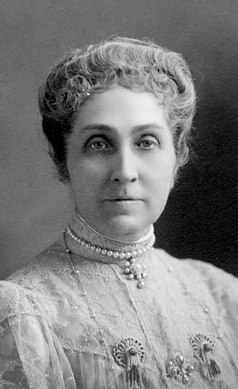
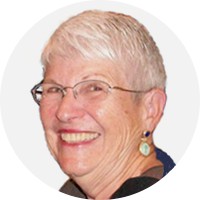
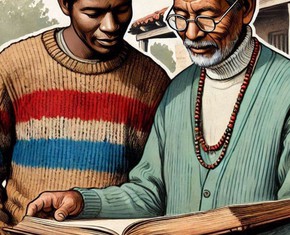

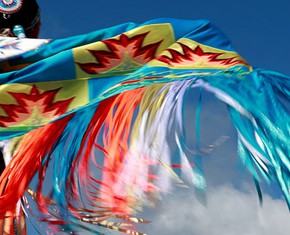


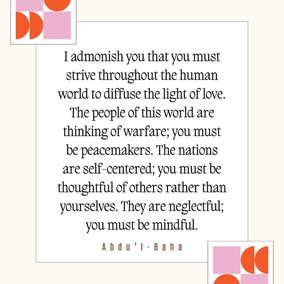
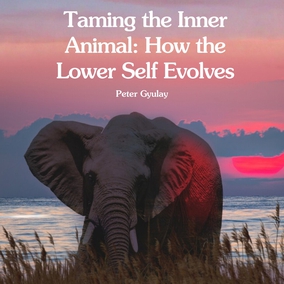
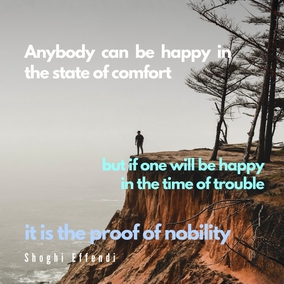
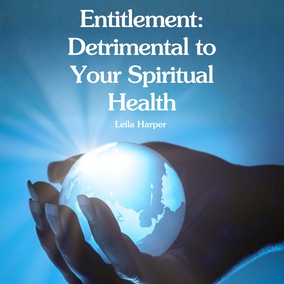
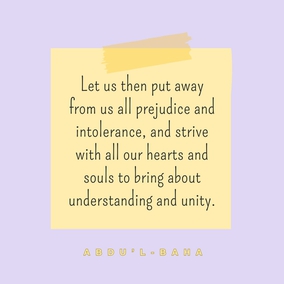
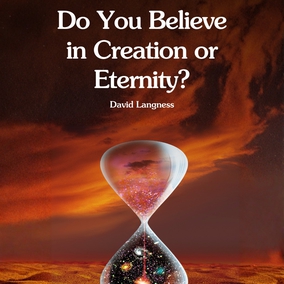

Comments
Sign in or create an account
Continue with Googleor